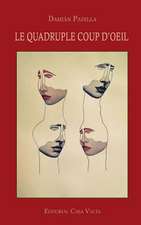The Masnavi of Rumi, Book Two: A New English Translation with Explanatory Notes
Autor Jalaloddin Rumi Traducere de Alan Williamsen Limba Engleză Hardback – 19 feb 2020
Preț: 384.95 lei
Preț vechi: 468.63 lei
-18% Nou
Puncte Express: 577
Preț estimativ în valută:
73.67€ • 76.44$ • 61.57£
73.67€ • 76.44$ • 61.57£
Carte disponibilă
Livrare economică 24 februarie-10 martie
Livrare express 08-14 februarie pentru 62.56 lei
Preluare comenzi: 021 569.72.76
Specificații
ISBN-13: 9781788313148
ISBN-10: 1788313143
Pagini: 512
Ilustrații: 8pp colour plates
Dimensiuni: 156 x 234 x 38 mm
Greutate: 0.93 kg
Editura: Bloomsbury Publishing
Colecția I.B.Tauris
Locul publicării:London, United Kingdom
ISBN-10: 1788313143
Pagini: 512
Ilustrații: 8pp colour plates
Dimensiuni: 156 x 234 x 38 mm
Greutate: 0.93 kg
Editura: Bloomsbury Publishing
Colecția I.B.Tauris
Locul publicării:London, United Kingdom
Caracteristici
The first modern, full translation of the Masnavi, Rumi's spiritual masterpiece, with accompanying Persian text
Notă biografică
Mowlana Jalaloddin Balkhi (1207-1273), known to the West as Rumi is a Persian poet comparable to the greatest poets of Europe. In 1244, Rumi began the composition of a body (divan) of lyric poems (ghazals) totalling 35,000 verses. In the early 1260s he turned to the composition of his most mature and final work, the mystical masterpiece in six volumes of Persian verses known as the Masnavi-ye Ma'navi 'The Spiritual Couplets'. Alan Williams is Professor of Iranian Studies and Comparative Religion at the University of Manchester and the translator of Spiritual Verses (London, 2006).
Cuprins
PrefaceChronologyIntroductionFurther ReadingNote on the TranslationEnglish translation of the Masnavi Book 2 'The Ending of the Self'Notes to Rumi's PrefaceNotes to the Masnavi Book 2Appendix: Analytical Index of the Stories and Discourses of Masnavi Book TwoIndexPersian Text of the Masnavi Book 2, Edited by Mohammad Este?lami
Recenzii
In mid-thirteenth century, as the Mongol hordes were destroying the fabled city of Baghdad, in the small city of Konya to the northwest Rumi was erecting a world of mystical vision in words whose amazing architectonics and blinding beauty would prove hard to imagine and harder to grasp with any sense of immediacy. In Alan Williams' English translation of the Spiritual Couplets, we finally stand a chance not only to access that vision in all its inner glory and eternal grandeur, but ultimately to gain an immediate sense of its graceful relevance not just to our time but to all of humanity through the millennia.
The Masnavi's new English translation is the publishing event of the year. At the hands of Alan Williams, Rumi's "cumulative polyphony" resembles a Shakespeare play where the poet speaks 'in one character after another . . .' This monumental poem's opening couplet, among the most captivating ever written, fills my heart with sadness every time I read it: "Listen to this reed as it is grieving, / it tells the story of our separations". Who could stop listening to this music after hearing these first notes?
'Alan Williams has done full justice to a moving part of Rumi's spiritual masterpiece and readers will find themselves turning the page almost unconsciously, eager to discover what comes next. For the second time Williams' masterly translation, the detailed contents list, the deep scholarship, lightly worn, of the introduction and the notes, all combine to make this book a spectacular triumph.'
Alan Williams brings us an English version of that epic spiritual masterpiece which is both reliable and fluently readable. The Introduction provides an indispensable key to the Masnavi's sudden, bewildering shifts between multiple dramatic voices and perspectives, the distinctive feature which makes this poem, for every reader, "the mirror of our innermost state."
While maintaining the Persian flavour of Rumi's epic and lyric virtuosities, this superior translation by Alan Williams brings Rumi fully to life in English. Professor Williams combines his erudition and sophistication as a scholar with his poetic flair, to do justice to Rumi's sublime poetry for a modern readership.
The Masnavi's new English translation is the publishing event of the year. At the hands of Alan Williams, Rumi's "cumulative polyphony" resembles a Shakespeare play where the poet speaks 'in one character after another . . .' This monumental poem's opening couplet, among the most captivating ever written, fills my heart with sadness every time I read it: "Listen to this reed as it is grieving, / it tells the story of our separations". Who could stop listening to this music after hearing these first notes?
'Alan Williams has done full justice to a moving part of Rumi's spiritual masterpiece and readers will find themselves turning the page almost unconsciously, eager to discover what comes next. For the second time Williams' masterly translation, the detailed contents list, the deep scholarship, lightly worn, of the introduction and the notes, all combine to make this book a spectacular triumph.'
Alan Williams brings us an English version of that epic spiritual masterpiece which is both reliable and fluently readable. The Introduction provides an indispensable key to the Masnavi's sudden, bewildering shifts between multiple dramatic voices and perspectives, the distinctive feature which makes this poem, for every reader, "the mirror of our innermost state."
While maintaining the Persian flavour of Rumi's epic and lyric virtuosities, this superior translation by Alan Williams brings Rumi fully to life in English. Professor Williams combines his erudition and sophistication as a scholar with his poetic flair, to do justice to Rumi's sublime poetry for a modern readership.

























